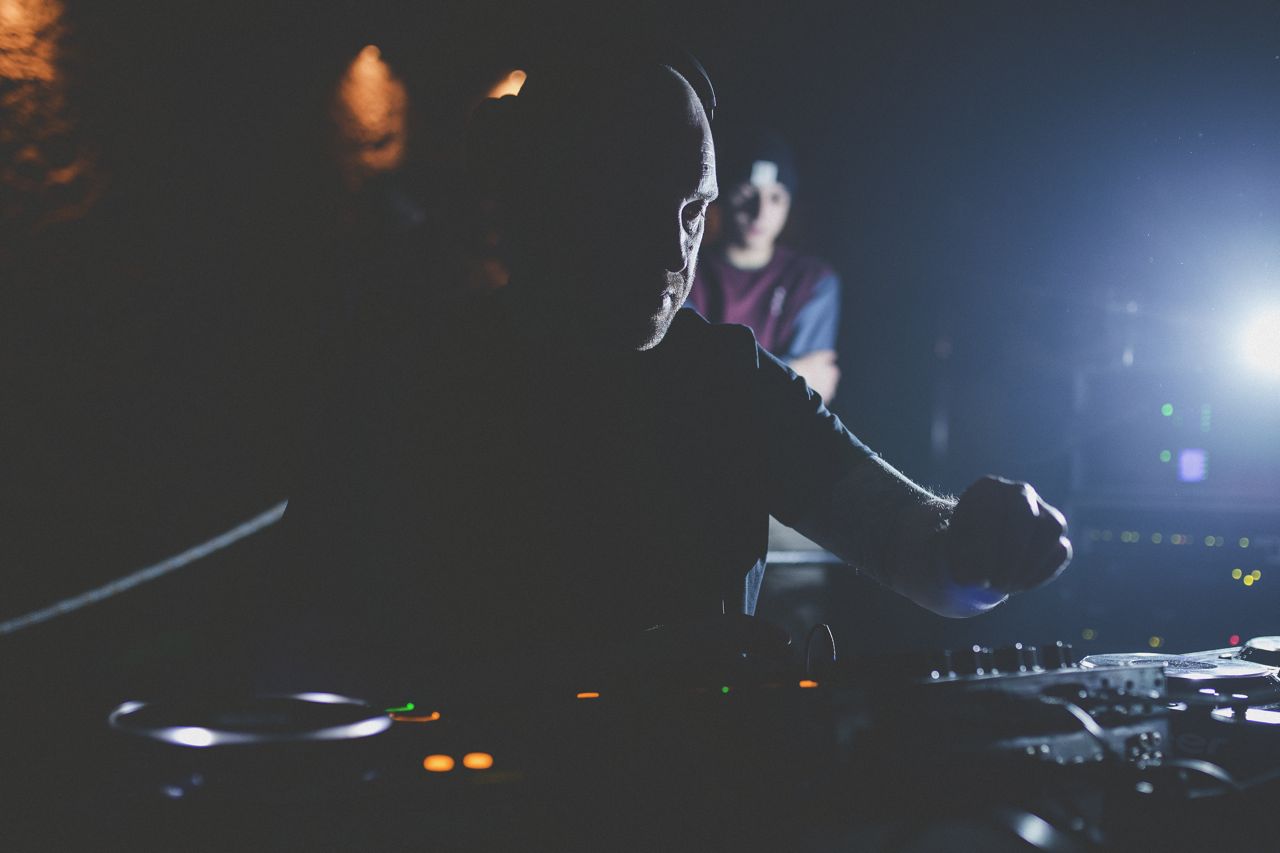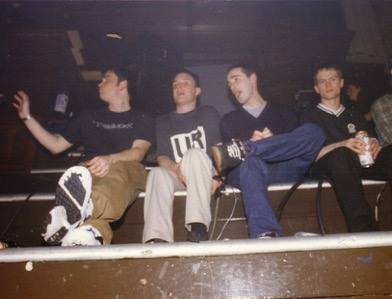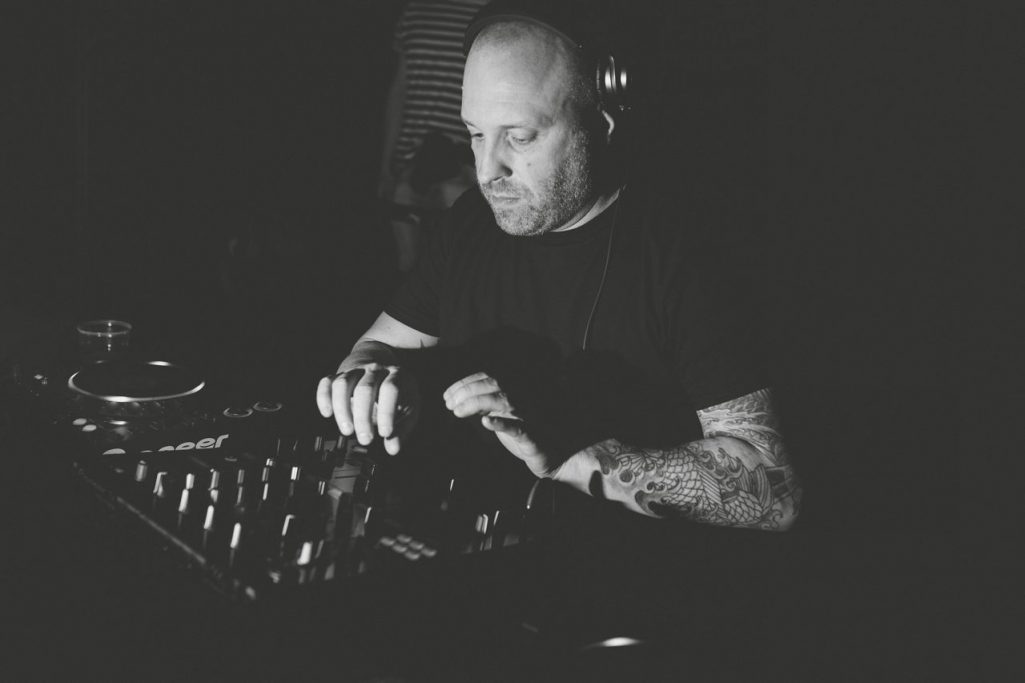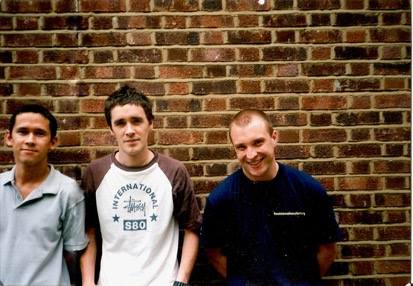„Twenty years is a very long time in music, and when I look at how things have changed over that period I realise how essential it is to be able to adapt and push what you are doing.“
In most cases, we bring you talks and features with artists whose journeys just started and their talents are something that you shouldn’t miss. However, this time we got an amazing opportunity to have a small talk with a man who has been part of the music scene for more than 20 years and represents one of the icons of the U.K. techno sound – James Ruskin. His imprint named Blueprint Records that he co-founded in the year of 1996 with his close friend Richard Polson is now stepping into its 20 years of existence. If we consider how massively the music industry has changed within last few years, this fact is more than praiseworthy.
London based James Ruskin found his passion for music quite early through Electro and Techno records and it didn’t take a long time and he felt it was the right time to establish an own imprint. Since the mid 90s Blueprint has been an important part of the U.K. techno movement and brought together releases of legends such as Surgeon, Karl O`Connor aka Regis or Oliver Ho. Although the label has experienced a short hiatus after the tragical death of one of its founders Richard Polson, it was able to carry on in its journey and successfully exists on the scene that became packed with tons of new music and artists. Our talk with James brings you a unique statement of an artist who stood around at the birth of underground scene that slowly transformed into main electronic music genres as well as a man behind an independent label that had to transform so it could stay alive in the thriving digital world.
Interview by Simona Hypsova
Photos by Andrea Lombardini and James Ruskin
The Blueprint label was born during the wild 90s. If I am not wrong, quite important for its birth was the rave and clubbing culture – we are talking about stuff as LOST. How was the atmosphere back in the days in the beginnings? Do you miss these days?
Our formative years before the label began were definitely shaped by clubs such as Lost. There were very few places where you could listen to the music that we were pursuing, and when you had the opportunity to be in the right environment with people that were also on the same wavelength everything made sense. The whole thing came together and left you in no doubt that this was more than just going out on a Saturday night. I would like to go back to that time and feel the excitement of the beginning on this path and seeing things from the naive point of view that people do when they discover something that is taking over their lives to such a degree. They were certainly very different times and as you get older I guess nostalgia creeps in a little, but it would be great to feel that excitement of hearing „Step to Enchantment“ again for the first time.
We can say that Blueprint label belongs to the first wave of the UK techno labels which have been connected to a very special aesthetics of techno sound. It’s interesting that the most significant imprints and artists of the UK techno have been placed in the middle of the UK in or around Birmingham city, although Blueprint is a London thing. Have you always been based in London? Could you talk us through how was your journey to techno sounds? And mainly, was it hard for you to start a techno label in London (if we consider that most of things happened in the middle of the UK)?
A majority of my life I have been based in London and I have always surrounded myself with the music. I suppose my journey to Techno began with being given a Jean Michael Jarre album called Equinox, it was this record that started my obsession with synthesised sound. From there I was searching out and listening to any form of electronic music and in particular the very early Hip Hop and Electro records that were mainly coming from New York and Detroit. People like Cybotron were an early indication of how things were progressing and this all evolved and led into what later became known as Techno. Later down the line the natural progression was to buy equipment and begin learning what was needed to realise our own ideas with what we had, and eventually be in a position to release some music. As far as starting the label I don’t think it was any harder that anywhere else to be honest, there has always been people that are willing to point you in the right direction to get things done, and the network of distributors and people that are working the same sphere were all interlinked to some degree anyway, so there was certainly no isolation, and I think this would be true anywhere.
„I’m proud of every release and the fact that as a label we have been able to adapt to the changes in the music industry, whilst still sticking to the original ideology that myself and Richard had mapped out at the beginning.“
From your point of view, why do you think that the UK techno movement has settled in the middle of the UK? Is there anything special element that f.e. London does not have?
To be honest I am really not aware of this, we are all products of our environments and the influences that our surroundings give us, but there are pockets of productivity all over the country. I think a lot has been documented about the rise of Birmingham sound with the labels and distribution that it spawned and this was undoubtably a huge part of the advancement of U.K. Techno, but I have never felt that its a regional thing or that it was a necessity to be based in any particular location to make things easier. The important thing is always the music and your belief in what you are doing, after that everything will fall into place regardless of where you are based.

Regis, James Ruskin, Richar Polson, Surgeon
(photo from personal archive of James Ruskin)
Recently I read an interesting interview with Brian Eno who stated following words: “I want to make a music which can create a certain fingerprint of times in which was made. A music that can serves as a witness… Like paintings do.” If we apply this theory on techno music and use it on the case of the musical scene in Germany for an example, it’s obvious that techno created some kind of musical soundtrack in the 90s when the country has experienced major changes of social climate. What do you think has techno witnessed in the UK (if so) through its existence? Do you think that techno nowadays days can still serve as some kind of [alternative] social statement?
With the music that I have made and released over the years I have always felt that this was a snapshot of a certain period of time and it related to my own circumstance and surroundings as a producer. Electronic music in general was the alternative for a long time and was an underground movement that was very much on the fringes of musical culture. With Techno and also House music we saw a monumental shift in youth culture that I don’t believe we will ever witness again. What began as a niche musical movement exploded into what has now become the soundtrack and right of passage for a whole generation of kids growing up, and beyond that the influences of what was always an underground scene has seeped into everyday life. Club culture in general is now the norm and a far more accept part of growing up. I think as a social statement initially people felt that this lifestyle and the music it spawned was a way of rejecting any kind of control, but as with all so called underground cultures they rarely remain in the shadows once the word spreads, and that happens very quickly today with the internet giving people the ability to reach every corner of the Earth at the click of button.
Establishing a label in mid 90s could be from a current point of view a bit advantage – especially if we consider the amount of labels on the musical scene during that time. For today’s producers and labels it can be sometimes tricky to get recognized and make a name on the scene. How is it for you to run the label nowadays? Do you feel any advanteges / disadvantages in current times?
There were obviously far fewer labels around in the 90’s and this was due to many different reasons, but mainly I would say because of the level of investment and also commitment that was involved to have the facilities to record music, and also to set up a label or get signed to be able release the music. Today things are considerably different and we have studios in a laptop and digital releases which allow people to be able to get their ideas down and offer them to the world very easily. This leads to a situation where there is a massive amount of artists and music coming along each week, so to be able to get noticed becomes much harder these days as we only have a finite amount of time to search out, and a certain amount of money to buy music. You have to approach running a label differently now and always be aware of what can be achieved with each release, and to a large degree use the tools that are available to you to make it work.
What was the hardest and the most amazing moments of the Blueprint’s 20 years history for you?
I suppose I would have to look back to receiving the first record form the pressing plant as being the most amazing moment, as we now had something tangible in front of us that was the product of all the planning and belief that this is what we wanted to do. The hardest part was undoubtably loosing Blueprint’s co-founder Richard Polson in 2006, although we had worked separately for some time he was still one of the founders, and loosing my friend left a massive void.
What is the thing that you are most proud of?
I’m proud of every release and the fact that as a label we have been able to adapt to the changes in the music industry whilst still sticking to the original ideology that myself and Richard had mapped out at the beginning. Being able to engage and remain relevant with the next generation of producers and fans of Techno that are going to take the music onto the next stage is something that I am also so happy to be involved with. Twenty years is a very long time in music, and when I look at how things have changed over that period, I realise how essential it is to be able to adapt and push what you are doing.
Blueprint catalogue features EPs of long-term techno kings, but within the last few years releases have been published by [at that time] not so well known producers like Samuel Kerridge, Lakker or Sigha. How do you choose producers that you want to work with? What is crucial for your decision? Do you choose from received demos or you pick new talents based on the recommendation from your DJ/producer mates?
I’m not sure it was an immediately conscious decision to start working outside of the group of people that had been involved from the beginning, but after I had a break with the label when we lost Richard I felt it was also time to expand what I was doing with Blueprint and work with a wider group of artists. Things tend to come on to my radar a majority of the time through one way or another rather than me searching new artists, and this approach tends to work for me. Personally it would be impossible to keep on top of absolutely everything that is happening with electronic music these days, as the amount of music being made and released is just huge, and would become a full time job in itself. Things have tended to happen very naturally and I believe that is the best way for me to approach running Blueprint, and I don’t think that will ever change.
“I think the upturn in vinyl sales was not something that shocked me to be honest as people generally like to have a something tangible in their hands that they can realise the ownership of, that´s impossible with downloads, what you have is a hard drive in the corner of the room with no character or identity.”
In one interview you said: “It’s about pressing vinyl and keeping this thing alive; so wheter you sell 500 or 5000 records if your belief is what is on that vinyl and that’s all that matters.” What are your thoughts of ongoing huge return of physical releases, especially vinyls? What do you think stands behind this little paradoxical phenomenom in the digital era?
The return of physical releases are still in no way comparable to the level of sales we had in the early days. This is due to a few different reasons, but the amount of music being released now is immeasurably more than we had, and people only have a certain amount of disposable income to spend on records. I think the upturn in vinyl sales was not something that shocked me to be honest as people generally like to have a something tangible in their hands that they can realise the ownership of, that’s impossible with downloads, what you have is a hard drive in the corner of the room with no character or identity. There is nothing tactile about an mp3, you are not involved in the process of listening to the music you have purchased in the same way as removing a record from its sleeve and placing it on a turntable, this is a ritualistic approach and adds so much to the experience and you become part of the process. Also the idiosyncratic nature of vinyl adds a variable to the sound that a digital file can never replicate. The other aspect is the visual point of reference with the artwork, this can also be massively important as it’s part of the representation of the project as a whole.
In the year of 2016 two big names associated with early days of the label returned to the label – Surgeon and Oliver Ho. Their releases sound amazing and will be dancefloor killers for sure. What brough these great artists back on Blueprint?
With the Surgeon’s release I had a call from Tony saying he had recorded a 12“ for Blueprint. This wasn’t something we planned it just happened, and this is when things come together in my opinion. My relationship with Tony began after we had sent him a test pressing of the first release, so to have him record a record for the 20th anniversary was very special. With Oliver I was keen to get him to look at recording a techno record under his own name again as it had been a long time since he had, and as he has always been an integral part of the history of Blueprint we both felt the time was right for him to reignite that side of his production. What is interesting for me is hearing the cross pollination of his other projects into this record.
„With Techno and also House music we saw a momumental shift in youth culture that I don’t believe we will ever witness again. What began as a niche musical movement exploded into what has now become the soundtrack and right of passage for a whole generation of kids growing up, and beyond that the influences of what was always an underground scene has seeped into everyday life.“
In the end of May, a compilation “20 years of Blueprint” featuring artists like O/V/R, Lakker, Makaton or Randomer has been released. Are you also planning on any events featuring producers of this compilation? If so, could you tell us more details?
We have been curating several events this year to coincide with the compilation and the anniversary, the last being in London in August in conjuction with The Hydra. The idea for any events is to be able to curate a night that is musically cohesive and representative of Blueprint, and also to offer promotors all the artists so we can tailor the nights to also suit their events. It is definitely something I enjoy putting together.
After finishing the celebrations of 20 years anniversary, what will be next for Blueprint?
I am not one to look to far ahead to be honest as my organisational skills are not that good and things tend to evolve at their own pace which normally means any plan gets pushed to one side anyway. My focus has been to achieve what I had set out to this year then move into next year with releases I already have in place, and continuing to work with the newer artists on the label.
Besides your own releases you have been involved in a few other projects. One is titled O/V/R with Karl O’Connor aka Regis. Can we expect any new release or live gigs from you guys in 2016?
This is always an ongoing project and we have just released a 12“ on Blueprint called „Easy Prey“ and there have been several remixes recently, one for Ansome on Perc Trax, another for Phase on Token Records and also we remixed a Jeff Derringer track for Soma recently. We are both always keen to get back in the studio, although it can be difficult with our schedules. We do play out together fairly a regularly either Live or DJing and this is something that has continued over quite a few years now.
Making music and being around in such environment for more than 20 years, I must ask – what is it that you love about music?
I love that electronic music always continues to evolve, we have an endless palette of sound that is there to be used and abused and we are not held back by any restraints on instrumentation or musical theory, they only restraint is the imagination of the producer and what they want to achieve with the tools they have. I find the manipulation of sound really interesting and this can be realised in endless ways with the equipment we have available to us, and the technology we have available these days. It´s the ability to constantly reinvent and stretch the possibilities of the music that allows us to keep engaging the newer generations, and even after more than 30 years it is still alive!

Oliver Ho, Richard Polson, James Ruskin in London, 1998
(photo from personal archive of James Ruskin)













